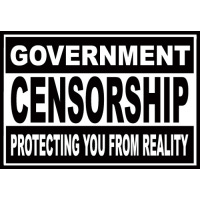More documents are being classified secret by the gov't. "enabling corruption and malfeasance" to grow

Senators Mark Udall and Ron Wyden are upset about something, they just can't say what. In a letter sent to the National Security Agency this week about a fact sheet on its surveillance programs, the senators complained about what they refer to only as "the inaccuracy". The inaccuracy is "significant". The inaccuracy could "decrease public confidence in the NSA's openness and its commitment to protecting Americans' constitutional rights". But, because the information underlying it is classified, the inaccuracy can't be described.
This is either a frustrating illustration of the absurdities of America's secrecy regime, or the start of a pretty solid vaudeville act.
The frenzied public debate over the NSA leaks has focused on the correctness of the government surveillance programs themselves. But America cannot properly debate these and future surveillance efforts until it decides what can be debated.
As an official in the first Obama administration, I worked in jobs requiring top secret clearance. I know firsthand how essential secrecy can be to effecting policy goals and how devastating leaks can be. I navigated diplomatic relationships threatened by the indiscriminate release of WikiLeaks documents, and volunteered on the taskforce that sifted through them, piecing together the damage done. But it is also true that a culture of over-classification has shielded too much from public debate and that more could be disclosed without damaging the efficacy of intelligence programs.
Trillions of new pages of text are classified each year. More than 4.8 million people now have a security clearance, including low level contractors like Edward Snowden. A committee established by Congress, the Public Interest Declassification Board, warned in December that rampant over-classification is "impeding informed government decisions and an informed public" and, worse, "enabling corruption and malfeasance". In one instance it documented, a government agency was found to be classifying one petabyte of new data every 18 months, the equivalent of 20m filing cabinets filled with text.
It is difficult to argue that all or even most of that information should be classified. By keeping too many secrets, America has created fertile ground for their escape. Already, the Obama administration has been forced to initiate six espionage prosecutions for leaks – twice as many as every previous administration combined.
That level of disclosure should be the norm for future programs, and can still be instated in the case of the current NSA surveillance programs. Two Congressmen – Democrat Adam Schiff, who sits on the House Intelligence Committee, and Republican Todd Rokita – introduced a bill last week that would call on the Department of Justice to declassify the legal justifications for NSA surveillance efforts. Universal public disclosure of individual decisions could impede the efficacy of the program, but there is no reason the Department of Justice can't disclose its generalized legal reasoning. That's a drawer in the stadium of filing cabinets that America can safely open.
"You can't have 100% security and then have 100% privacy," President Obama said in the days immediately following the leaks. "We're going to have to make some choices as a society." But the government can and should let Americans know what choices it is that they're making. The intelligence community might find Americans, particularly young Americans most suspicious of government institutions, more sympathetic to their delicate balancing act as informed participants.
http://www.guardian.co.uk/commentisfree/2013/jun/28/nsa-surveillance-too-many-documents-classified
The DoD is blocking all articles about NSA leaks from 'millions' of computers:
The Department of Defense is blocking online access to news reports about classified National Security Agency documents made public by Edward Snowden. The blackout affects all of the department's computers and is part of a department-wide directive.
"Any website that runs information that the Department of Defense still considers classified" is affected, Pentagon spokesman Lt. Col. Damien Pickart told U.S. News in a phone interview.
According to Pickart, news websites that re-report information first published by The Guardian or other primary sources are also affected.
"If that particular website runs an article that our filters determine has classified information... the particular content on that website will remain inaccessible," he said.
Pickart said the blackout affects "millions" of computers on "all Department of Defense networks and systems."
The spokesman told U.S. News that original reports about the leaks may be specifically targeted for the blackout. He admitted that "automated filters are never perfect," and some reports may slip through the cyber blockade.
"Should any website choose to post information the department deems classified, that particular content on the website will be filtered and remain inaccessible from DoD networks so long as it remains classified," Pickart reiterated in an emailed statement.
http://www.usnews.com/news/blogs/washington-whispers/2013/06/28/blackout-defense-department-blocks-all-articles-about-nsa-leaks-from-millions-of-computers


